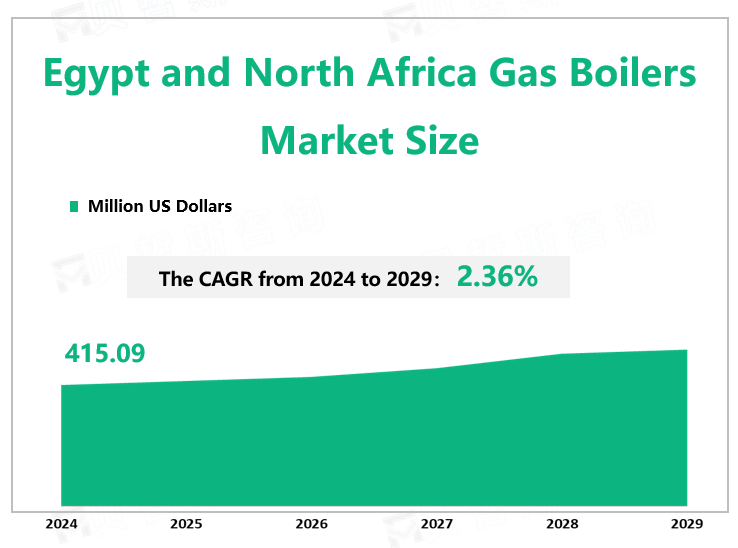Egypt and North Africa Gas Boilers Market Overview
According to Global Market Monitor, the Egypt and North Africa gas boilers market size is $415.09 million in 2024 with a CAGR of 2.36% from 2024 to 2029.
A gas boiler is a central heating system that acts like a small fire and continuously heats the water. These heated water pumps are then pumped through the pipes and radiators to heat the space and pumped directly to the faucet and shower (like a combined boiler) or stored in a hot water tank for future use.
Market Drivers
Gas boilers are mainly used to heat water for steam production and treatment and are powered by gaseous gasoline or propane. Gas boilers are used for water and space heating arrangements. They have excellent operational advantages, such as reduced consumption during shutdown and simple support driven by sufficient sensing ports. In addition, the layout of gas boilers is not as complex as that of different types of boilers. Increased demand for space and water heating solutions is driving the development of the global gas boiler market. Driven by the development of industry and energy, oil development, mainly in North African economies, has increased the demand for boilers. This in turn promotes the development of the gas boiler market.
Limitations
Natural gas has an increasing proportion of its use in primary energy because of its advantages in environmental protection. The contradiction between supply and demand and the law of value will inevitably lead to action by North African countries, which is linked to other primary energy price fluctuations. In addition, the shortage of natural gas and the incomplete construction of pipelines in North Africa are also the reasons for its effect on the industry's further promotion. Biomass boilers require more work than traditional gas and oil-fired boilers. The price of biomass boilers is higher than that of conventional gas or oil-fired boilers, and equipment maintenance costs are relatively high.

Market Trends
Focusing on the continuous advancement of energy structure conversion and strict emission reduction requirements, gas boilers will continue to develop in the direction of low nitrogen emissions and condensation. In the future, we should focus on decentralized and timely heating, focusing on R&D, system integration, and engineering of deep gas utilization technologies and products. Using staged combustion technology, rich and light combustion technology, steam atomization technology, premixed combustion technology, and central steady combustion jet combustion technology, combined with flue gas recycling technology and combustion control technology to maximize the control of nitrogen dioxide emissions; Develop high-end heat exchange equipment, effectively reduce the boiler exhaust temperature, recover the sensible heat of the flue gas and the latent heat of steam in the flue gas, improve the boiler thermal efficiency and reduce the gas consumption.
Application Fields
Gas-fired boilers can achieve up to 95% efficiency, which is more efficient compared to other boilers. As a result, the demand for gas-fired boilers for residential and commercial applications is expected to surge in the coming years. The residential application of gas boilers is to heat water, therefore, the growth of residential building construction is expected to drive sales of gas boilers in the coming years. The capacity of gas-fired boilers is designed according to their application in residential, commercial, and industrial Spaces. Residential applications use gas boilers for small capacities, and commercial Spaces and industrial use gas boilers for all (small, medium, and high) capacities.
|
By Type |
Natural Gas Boiler |
|
City Gas Boiler |
|
|
Coke Oven Gas Boiler |
|
|
Liquefied Petroleum Gas Boiler |
|
|
Biogas Boiler |
|
|
Others |
|
|
The natural gas boiler segment contributes the largest market share. |
|
|
By Application |
Commercial |
|
Industrial |
|
|
Residential |
|
|
The commercial segment occupies the biggest share. |
We provide more professional and intelligent market reports to complement your business decisions.